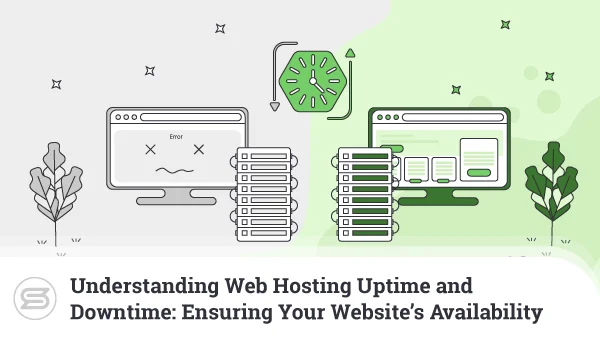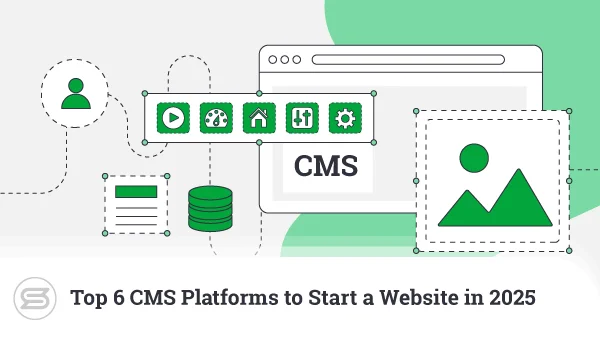How to Choose Your Web Hosting
Nowadays you can hardly find any serious company that doesn’t have its own website. Regardless of your business niche, people are increasingly leaning toward online shopping, and if you don’t offer such services — someone else will.
Building a fast and good-looking website that’s available at all times, your first step is finding a reliable host.
This article will outline the different types of services and how to choose your web hosting provider.
There are thousands of different hosts on the market today, so it’s crucial to first understand your needs before you go blindly shopping for one. Different hosting types are more effective with different web projects, so we will make sure to explain each solution with its unique specifics.
Hosting Types
In terms of server environment, there are three general types of web hosting:
- Shared Hosting
- VPS Hosting
- Dedicated Services
Let’s take a closer look into each one to understand its purpose better.
Shared hosting
This is a hosting solution which allows many users to utilize the resources of a single server simultaneously. Each of the hosted websites gets some of the CPU, RAM, space, and bandwidth. Note that, while some providers like to speculate with the buzzword “unlimited”, there are no such things when it comes to tangible resources (ex. server storage).
Shared hosting is by far the most popular hosting solution in the world, and there is one main reason for that – the price. The majority of websites don’t really require much resources, so it doesn’t really make sense to spend heaps on a VPS or dedicated server. Shared accounts from reliable providers often cost between $3-$9/mo, which is extremely affordable, even for a startup.
It’s not just good news, though.
Eager to maximize their profits, some hosts overcrowd their servers with more users the machine can handle. And because it’s not a caged environment, every client starts to suffer from slow loads and even downtimes.
Security is another possible issue. Even if you apply the latest security measures on your website, once an attacker breaches through a neighboring account on your server, they get access over all websites on the same machine.
The traditional shared hosting is better suited for personal and small business websites that aren’t necessarily mission-critical. You benefit from an affordable hosting solution, which includes server management, maintenance, and updates for just a few dollars per month.
Shared hosting is not suitable if:
- You have high requirements for data privacy and security
- You aim for high email delivery rates.
- You want your website to load fast and uninterrupted at all times.
- You have a well-populated and resource-hungry website.
- You are looking for a custom software installation.
Depending on your server configuration, there are actually some sub-types of shared hosting.
Reseller Hosting
Reseller hosting is a service that strongly resembles shared services, but differ in the purpose of usage. More often than not, web developers and designers work with a lot of clients who need web hosting. Many professionals prefer to host customers with no more than 1-2 providers, because of the easy management and support.
Reseller hosting allows people to monetize from those efforts. The provider gets you an account, which you can split into many instances and sell them as if you were the host. There is no limit on the overhead you can make from the price difference — you have the full freedom to charge your clients as you see fit.
With reseller hosting, you get access to an administrative control panel where you manage the service. It’s a comprehensive dashboard where you can create hosting plans, delete users, allocate resources like space, traffic, emails,, and databases. The administrative area lets you easily control all clients without them knowing about one another. Each user gets a separate control panel and login credentials so their projects remain completely independent.
Even if you are not a developer with multiple clients, you can simple use reseller hosting as a business venture. Many providers offer white-label services, which hide all your ties with the source host. This way, you can appear as a standalone business that offers quality web hosting under your brand.
Shared Cloud Hosting
Shared cloud hosting is a relatively new type of hosting service, which appeared with the rise of cloud computing. While it has many of the features of traditional shared solutions, the server setup is completely different.
Cloud servers utilize a huge network of machines that spread across the whole world. As there is no single point-of-failure, users can benefit from maximum stability and site availability. Even if a hardware component stops working, the other servers in the network “take the load” so there isn’t even a second of downtime.
One of the important things you should look for in a cloud service is the utilization of SSD. Solid-state drives are essential for the speed of the server and the loading time of all websites on it.
Cloud hosts save your site info in central data banks which are maintained via SAN (Storage Area Network). The frequency of requests is really strong here, and that’s why it is crucial for the disks to be fast enough, otherwise, the whole network will run slowly.
Overall, shared cloud hosting is a bit more expensive than traditional solutions, but it’s money well-spent in this case. You get higher availability and security, while the speed mostly depends on the host’s configuration and disk drive technology.
Virtual Private Server (VPS)
Virtual servers are getting more and more popular in the last few years, mainly thanks to the technology evolution and lowered prices.
VPS hosting is the best solution for businesses that need enhanced functionalities and security for their web projects, but cannot afford the high costs involved with a dedicated server solution. The secret lies in their configuration.
Web hosting providers can split a physical server into several virtual instances, each completely independent from the others. This is achieved through a process called virtualization. It creates a caged environment for each user, allowing them to customize the account as they wish.
VPS solutions resemble shared hosting in the sense you have multiple clients on the same server. The major difference is in the level of control over the machine.
Each VPS client can install their own operating system, choose a specific software, or tweak settings on the virtual server. That eliminates a lot of dangers that normally come with the shared nature of the hosting environment.
Virtual servers also have their subtypes:
- Managed VPS hosting — this is the most popular option among business owners with zero previous experience. Instead of having to learn tons about server management, you are leaving the most crucial tasks to your hosting provider. This might include things like OS setup, software installations, server patches and upgrades, and all the technical issues you may encounter.
- Unmanaged VPS hosting — the most preferred option by technically advanced users. Developers enjoy full control over the server machine, with the freedom to customize practically everything.
This means they are also responsible for any possible issues and site problems they encounter along the way. The hosting provider is only responsible for the initial server setup and keeping its network constantly available. - Cloud VPS hosting — some virtual servers utilize the cloud in a way where disk resources are delivered to the physical servers (hypervisors) via a separate SAN network used only for disk operations. There is a double security model on each level, so even if there is a hardware failure, the client website will remain active.
Cloud VPS servers are not a separate service per se, they are basically outlining the type of infrastructure and setup the host is using.
Dedicated Server Hosting
This is a type of hosting solution where the client rents an entire server for their needs alone. The hosting company is only responsible for provisioning the server from the datacenter in a working condition. Some providers may offer managed dedicated solutions. Opting for such a deal, you get an account admin who helps with any hardware and software issues.
You are the only user on a dedicated server, so you have full access to the processing power of the machine. There is no better way to maximize your speed and site performance, so the service is often preferred by big enterprises and resource-heavy websites.
But here comes the biggest disadvantage – the price. As you can imagine, this is the most expensive hosting solution because you are renting the entire server, regardless of your actual resource consumption. That’s why prices for dedicated hosting can often vary from about $100 to several thousand dollars per month.
Before you opt-in for a dedicated server, it’s always good to check with your hosting provider about your optimal configuration. This strongly depends on your traffic numbers, CPU and RAM consumption, whether you need RAID redundancy, and the specifics of your software.
Hosting Types Pros & Cons
Now it’s time to weigh up the pros and cons of the various hosting services on our list. As we have already found out, each of them can be ideal for certain client types, it’s only a matter of the purpose and requirements of their project.
Shared Hosting Advantages
+ Very low monthly investments
+ Enough resources for most small to medium websites
+ Server hardware management from the host
Shared Hosting Disadvantages
– Performance issues due to overcrowded servers
– Vulnerable security model
– Not a lot of room for growth
Conclusion
Shared hosting is the most affordable hosting solution for personal and small business websites. The service can be used for portfolios, blogs, forums, and websites that don’t contain private user or billing information.
VPS Hosting Advantages
+ More customization freedom and control
+ Optimized performance and seamless resource scalability
+ Isolated account environment for maximum security
VPS Hosting Disadvantages
– More pricey than shared hosting
– Best to have at least basic server knowledge to operate smoothly
– It takes some getting used to
Conclusion
Affordable VPS servers are like the middle ground of hosting services. They offer a highly scalable environment with dedicated server resources for each client. Often preferred by ecommerce shops and growing business websites in need of fast speeds and uninterrupted availability.
Dedicated Hosting Advantages
+ Full root control over the server environment
+ No resource limits
+ Great email deliverability
Dedicated Hosting Disadvantages
– Very costly, not suitable for businesses on a budget
– Requires advanced technical knowledge
– Less easy to use than other hosting solutions
Conclusion
Dedicated servers give you full computing power and freedom for customizations. You can host one or a hundred websites as long as they fit within the disk space. Often utilized by big enterprises and projects that need a very specific setup.
Web Hosting with ScalaHosting
In the past, having your own server was a luxury. plus most clients were content with the shared environment. As pioneers in hosting technologies, the ScalaHosting team have worked hard to create a service that allows each user the chance to have their own cloud VPS server with full management included, at amazingly low rates – close to those of shared hosting deals.
ScalaHosting takes care of the support and security of the server 24/7. But that’s just the tip of the iceberg.
Tackling the rising costs of the cPanel management tool, we created our own control panel called SPanel. It is fully compatible with cPanel and we include it for free with every managed VPS server.


Final Takes
Hopefully, this review contains enough useful insights to help you make an informed the decision for your website. But even if you still have any doubts, ScalaHosting would be glad to help with more expertise. Simply contact our operators 24/7 via live chat or email to get advice and tips on the best solution for your specific case.
FAQ
Q: What makes a good web hosting service?
A: There are a few essential elements that always mark a great hosting provider, especially if they combine more than one. Clients most often look for speed, uptime, security, support, and price. The user reviews should always be on the back of your mind as they can either re-confirm the stellar reputation of the host or reveal unexpected problems.
Q: What is the best hosting for small business?
A: Finding the right hosting service is especially crucial for small business owners and often boils down to the budget they’re prepared to invest. If money is tight, you can start on a shared plan and upgrade when you start to outgrow it. For maximum efficiency, SMBs can directly utilize a VPS hosting service and get a dedicated set of system resources solely for their website.
Q: How much does it cost to host a website?
A: The most affordable shared providers on the market can even offer an introductory price below a dollar, but the average in the niche floats around $3-$9/mo with reliable hosts. Virtual servers will up your budget a little, requiring from $10-$15 to $70-$80 per month. And then we have dedicated servers where you can expect anything from $90 upward, depending on the resource configuration.



